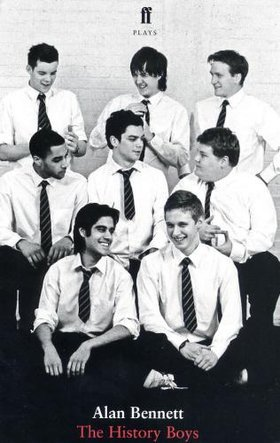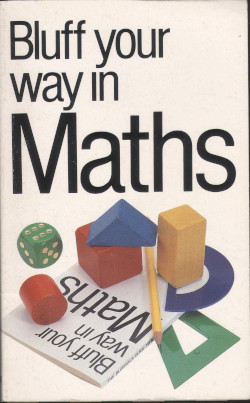[This post - on Alan Bennett’s play The History Boys when it was still new, my own French and maths education, and comedian Adam Bloom’s narrative maze-hedging - was originally published on LiveJournal on 4 August 2004 and is re-posted here as part of a migration from Livejournal. It has some minor editing, interjections from 2022, and fixing/replacement of broken links - not everywhere has been able to follow Tim Berners-Lee’s 1998-and-still-there advice that Cool URIs don’t change.]
A few weeks ago, I saw Alan Bennett’s enjoyable The History Boys at the National Theatre. Set in a northern grammar school in the mid-1980s, we watch a group of sixth-form boys prepare to apply to Oxbridge to read history while also, the blurb says, “in pursuit of sex [and] sport” (not that the sport was particularly evident).

Their three teachers are Hector, a long-time English master teaching General Studies:
I count examinations, even for Oxford and Cambridge, as the enemy of education. Which is not to say that I don’t regard education as the enemy of education, too… Oh, it would be useful… every answer a Christmas tree hung with the appropriate gobbets. Except that they’re learned by heart. And that is where they belong and like other the other components of the heart not to be defiled by being trotted out to order.
Irwin, a young supply teacher (later a journalist and political operative) brought in by an ambitious headmaster to arm the boys with charm, polish, and a presentational “sprig of parsley”:
The wrong end of the stick is the right one. A question has a front door and a back door. Go in the back, or, better still, the side. Flee the crowd. Follow Orwell. Be perverse. And since I mention Orwell, take Stalin. Generally agreed to be a monster, and rightly. So dissent. Find something, anything, to say in his defence. History nowadays is not a matter of conviction. It’s a performance. It’s entertainment. And if it isn’t, make it so.
And Mrs Lintott, who gave these boys the “Firm foundations type of thing” in their A-levels:
They know their stuff. Plainly stated and properly organised facts need no presentation, surely.
The play reminded me of my Additional French (a one-year course in the fifth form which hovered, I think, somewhere between a GCSE and an AS-level). Our translation and oral teacher was like Mrs Lintott: we certainly worked, and practised, and while those lessons rouse no passionate memories, we certainly had every opportunity to know our stuff. (And the preparation for the oral exam taught me more than I’ve ever needed to know about the distillation of whiskey, which we had to encourage our examiner to start importing to France.) Our literature teacher, on the other hand, reminded me more of Hector (without the impropriety, I must add). We studied Anouilh’s Eurydice, reading it, discussing it (and digressing from it) to death and almost back; I walked into that examination brimming with ideas but with scant idea of what I would see when I opened the paper. (Bear in mind, though, that this was some 12 [now 30…] years ago, and looking back does have its risks.)
I almost wrote that I didn’t recall an Irwin at my school. In mathematics (or, at least, mathematics examinations), there seems less scope for “finding [one’s] way to the wrong end of seesaws” or “settling on some hitherto unquestioned… assumption then proving the opposite” (although I suppose denying the Parallel Postulate and deriving a non-Euclidean geometry in under an hour might impress). But Robert Ainsley’s Bluff Your Way in Maths says, of university entrance exams,
The easiest exams to bluff your way through, because they rest on the excellent principle that the best way of solving a problem is the most economical, which is usually found by mathematicians who can’t be bothered to churn through the standard, long-winded methods, often summed up as ‘a lazy mathematician is a good mathematician’… Answers should be the minimum length and include phrases like:
- by symmetry, we can show that…
- it is obvious that…
- intuitively, we can see that…
- by continuity, we know that…

A mathematical Irwin would probably preach elegance and bold intuition rather than controversy: would this merely be a different scent of polish?
Bennett gives us a scene in schoolboy French (an improvisation set in a Paris brothel, transforming into a wartime Belgian hospital when the headmaster walked in). In contrast, Dan Brown’s Da Vinci Code [then-newish, and my bite-size reading for the Tube at the time] carefully explains and translates to make sure no-one will be left behind, thus giving one less chance to feel accomplished/self-satisfied/smug (one of those irregular adjectives?) at working out what is going on. Adam Bloom (whose BBC Radio 4 recording I went to see) talked (unshamedly self-indulgently) about the comedian’s challenge in erecting hedges which guide his audience to a punchline, not making the end too obvious but not losing them on the way, so the audience can feel good about itself: it probably applies similarly to novelists, playwrights, and the authors of adventure games. (At least those who run role-playing scenarios can tailor them if they turn out to have misjudged their players/audience, a luxury less available to the novelist or dramatist.) How much of this will make it into the radio broadcast of The Problem With Adam Bloom [more details at comedy.co.uk] I’m not sure, given the lengthy improvisation and short timeslot [and I don’t remember now if I even listened to the broadcast to find out]. (Our voicemail system at work makes recorded messages play faster and faster when you press “6” repeatedly, but doing that on the radio might be cheating.)
Subscribe to the newsletter: If you would like to be notified of new posts on this Eclectic Stacks blog, please subscribe to the free email newsletter (hosted with Buttondown).
You can subscribe either on the newsletter home page, or directly using the form below: